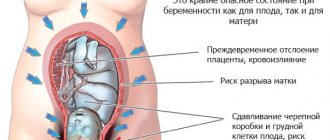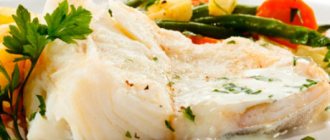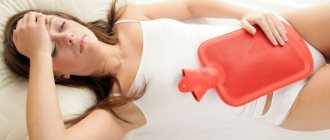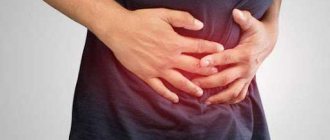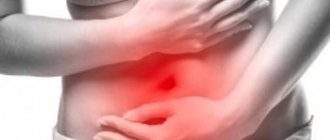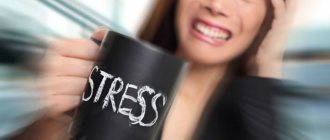Many people start their mornings with coffee. This drink perfectly invigorates and puts you in a working mood. However, the modern pace of life forces a person to literally have breakfast on the go, and the morning energy drink is often drunk on an empty stomach. Excessive coffee consumption can cause an unpleasant burning sensation and stomach pain over time. Why does a popular drink cause such symptoms? Should you completely eliminate coffee from your diet?
Main symptoms of heartburn
Heartburn causes discomfort in the upper part of the digestive tract. A strong burning sensation occurs in the throat and sometimes in the mouth. It is caused by the release of acid from the internal secretion of the stomach. This acid rises up, irritating the walls of the esophagus. People suffering from heartburn feel an unpleasant, bitter-sour taste in the mouth and are tormented by belching.
Constant reflux is also one of the symptoms of chronic gastritis, gastroduodenitis. The release of food debris mixed with acid negatively affects the condition of the esophageal mucosa.
Is it possible to drink coffee if you have heartburn?
If a person feels discomfort, an unpleasant burning sensation or pain in the stomach and sternum for a long time, it is worth consulting a doctor and undergoing the necessary examination. Perhaps it is not the strong drink that causes this sensation, but a chronic disease that is activated by caffeine.
Coffee for heartburn should be consumed in moderation. If problems begin after a cup of invigorating liquid, you should reduce the number of doses to 1-2 times a day. You need to monitor the quality of the product. It is necessary to drink the drink only after a meal, which should be moderate.
In case of serious illnesses, it is necessary to give up your favorite drink so as not to aggravate the situation.
Why does coffee cause heartburn?
Coffee causes heartburn for the following reasons:
- It contains caffeine and tannic acid, which help increase the level of gastric juice secreted and enhance the secretion of the digestive glands.
- The drink dilates blood vessels and at the same time helps to relax the muscles, including those surrounding the esophageal sphincter.
- The energy drink is a diuretic; frequent use can lead to dehydration.
The greatest danger comes from coffee drunk on an empty stomach. At the same time, gastric juice is released, which is necessary for the normal absorption of food. Since the stomach is empty, excess acid is released into the esophagus. Here hydrochloric acid is formed - an aggressive environment that has a harmful effect on the esophagus and leads to inflammation of its mucous membrane. This contributes to the development of the disease – esophagitis.
A hot drink causes vasospasm. Because of this, blood flow is disrupted. The esophageal sphincter stops functioning normally; it cannot close in time and prevent acidic gastric juice from entering the upper tract.
Coffee helps strengthen the functioning of all internal organs. Over time, this leads to a deterioration in their normal functioning and gradual wear.
If a constant burning sensation occurs, you should completely eliminate or reduce the amount of coffee consumed. But other foods in your daily diet can also cause heartburn. You can find out a more precise cause of discomfort by contacting a gastroenterologist.
Video - Foods that cause heartburn
Heartburn from coffee
Coffee in bed can bring not only a boost of energy, but also an attack of heartburn. On the one hand, caffeine tones and gives strength, on the other hand, it can cause a number of unpleasant consequences. As a rule, the daily dose of coffee should not exceed 1-2 cups. Excessive coffee consumption can provoke not only heartburn after eating, but also more serious consequences: central nervous system disorders, interruptions in heart function, vascular and liver dysfunction.
The nature of coffee heartburn
Heartburn is caused by gastric juice. If it is released in increased quantities, it irritates the mucous membranes. The causes of heartburn from coffee are the same. Gastric juice contains hydrochloric acid, which is necessary for digestion, but is aggressive in itself. Normally, food is digested immediately after eating, and acid production is balanced. In diseases of the gastrointestinal tract, acidity changes, gastric juice is secreted in large quantities and causes a burning sensation. This manifests itself with high acidity, gastritis, peptic ulcers, reflux, and also with the consumption of certain foods.
Reflux is a pathological condition. This is the return of food into the esophagus along with the remains of gastric juice. Reflux occurs when the lower esophageal sphincter relaxes.
Sometimes even a healthy stomach can malfunction. Heartburn after coffee is one of them, because the drink contains substances that provoke the production of hydrochloric acid.
Causes of heartburn after coffee
Heartburn is not a disease, but a sign of functional impairment. After frequent attacks, people learn about gastrointestinal diseases, in which the root cause of burning is hidden.
In 70% of cases, heartburn is caused by gastroesophageal reflux disease (GERD)[1]. Pathology occurs when the lower esophageal sphincter fails to cope with its function. Its task is to pass food into the stomach from the esophagus and not release it back. When the organ does not work properly, a reverse reflux occurs.
Heartburn from coffee can be a result of reflux, but caffeine can often cause more serious problems. Discomfort is associated with the composition of the drink:
- Caffeine. This is a tonic substance that acts on the central nervous system and the entire body as a whole. It even invigorates the digestive system and promotes the production of gastric juice. In addition, caffeine affects blood circulation, and this can disrupt the functioning of the lower esophageal sphincter, relaxes it, and causes reflux.
- Chlorogenic acid. The substance is not produced by the body, its importance can be debated. Chlorogenic acid consists of caffeic and quinic acids. It is found in many fruits and has antioxidant properties[2]. Caffeic acid has a positive effect on the heart and blood vessels and normalizes sugar levels[3]. The content of chlorogenic acid in coffee beans is the highest; it is responsible for the acidity of the drink. But the stomach reacts to it with increased secretion of juice. It turns out that immediately after drinking the drink, chlorogenic and hydrochloric acid act on the mucous membranes. They cause heartburn.
There are three bad habits that can also cause a burning sensation in your stomach. They are related to the way you drink coffee:
- On empty stomach. If you drink coffee on an empty stomach, the production of hydrochloric acid begins immediately. The result is an imbalance: there is a lot of gastric juice, but not enough food. He has no choice but to “digest” the stomach walls and mucous membrane.
- Washing down your meal with a coffee drink. Consuming coffee with food can also cause heartburn. It is better to wait 20-30 minutes after eating and drink a cup. By this time, the digestion process will have started and the effect of acids will be less aggressive.
- Smoking. Tobacco itself irritates the stomach. Together with coffee they pack a double punch.
If heartburn is systematic, be sure to consult a doctor.
How does heartburn manifest?
If a person has certain disorders, heartburn after coffee occurs almost immediately, and the less food, the faster this condition develops. The person feels a burning sensation and says that his stomach “burns.” The burning sensation has different localization:
- Belly, side, hypochondrium. The feeling of heartburn in these organs indicates the effect of the drink on the gastric mucosa.
- The esophagus and sternum become irritated when acids reflux into the esophagus and with constant high acidity.
- Throat and larynx. Most likely, heartburn was caused by reflux. Perhaps there are problems in the body, and the drink simply provoked them. Indirectly, heartburn in the throat may indicate a pathology of the upper esophageal sphincter - LPR (pharyngolaryngeal reflux). This disease is rare and is accompanied by other symptoms: cough, sore throat, hoarseness.
Symptoms of heartburn after coffee are the same as after other foods. If a burning sensation occurs not only after a cup of an invigorating drink, you should suspect gastrointestinal diseases: ulcers, gastritis, esophagitis, especially if bloating and belching appear.
Diagnostics
Diagnosis of heartburn after coffee includes the following studies:
- blood chemistry;
- fibrogastroduodenoscopy (FGDS);
- measurement of pH of gastric juice and pressure in the esophagus;
- endoscopy or chromendoscopy[4];
- stool analysis.
Heartburn from coffee requires urgent help if it is accompanied by alarming symptoms: anemia, weight loss, blood in the stool and a feeling of accelerated satiety [5].
Treatment
Before treating heartburn from coffee, observe your body. If the symptom is caused only by the drink, you can adjust the mode of its consumption. Choose dark roast varieties - they contain minimal chlorogenic acid and caffeine. Coffee with milk reduces the aggressive effect on the stomach. If you consume chocolate with coffee, heartburn makes itself felt faster, as chocolate relaxes the sphincter.
First aid for heartburn can be antacids - these are salt-based drugs that neutralize hydrochloric acid. Gastroenterologists recommend them in the treatment of reflux disease and for temporary relief of symptoms[6]. Rennie® is a tablet that simultaneously contains two antacid components. Calcium carbonate and magnesium carbonate reduce the aggressive effect of the acid within 2 minutes. Thanks to its chewable form, Rennie® can be taken quickly anytime, anywhere. It has a favorable safety profile and is approved even for pregnant women. It has a pleasant orange or mint flavor.
You must take medications strictly according to the instructions or as recommended by your doctor.
[1] Heartburn Guide. Global Perspectives. World Organization of Gastroenterology, 2015.
[2] Deineka V.I., Khlebnikov V.A., Sorokopudov V.N., and Anisimovich I.P. “Chlorogenic acid in fruits and leaves of some plants of the Berberidaceae family” Chemistry of plant raw materials, no. 1, 2008, pp. 57-61.
[3] Chuklin R.E., Maslikova G.V. CLINICAL PHARMACOLOGY OF CAFFEIC ACID // International Journal of Experimental Education. - 2016. - No. 12-3. - pp. 436-437;
[4] UNIFIED CLINICAL PROTOCOL OF PRIMARY, SECONDARY (SPECIALIZED) MEDICAL CARE. GASTROESOPHAGEAL REFLUX DISEASE. Order of the Ministry of Health of Ukraine dated June 31, 2013 No. 943.
[5] UMHS GERD Guideline, September, 2013. Guidelines for Clinical Care Ambulatory, University of Michigan Medical University.
[6] Global recommendations of the World Gastroenterological Organization. GERD. A global perspective on gastroesophageal reflux disease. 2015
How to reduce the negative effects of coffee?
To eliminate heartburn, you need to reduce the amount of coffee you consume. Experts recommend drinking no more than two cups of coffee per day. People suffering from reflux should avoid drinking coffee altogether. The same should be done for people suffering from gastritis or ulcers. You can soften its effect by adding milk or low-fat cream to the drink. Dairy products coat the walls of the stomach, protecting epithelial cells from destruction.
Important! Heartburn can be caused by sugar added to coffee. Sugar stimulates increased production of gastric secretions. Experts advise adding a minimal amount of sugar to tea and coffee.
It is not recommended to add lemon juice and other citrus fruits to coffee, which further increase its acidity. After drinking the drink, you should not do physical exercise or bend down. It is best to drink coffee before breakfast. You should not drink it after eating. It is also not recommended to drink liquid that is too hot; it must be cooled.
How to get rid of heartburn after coffee
Can't resist a cup of your favorite aromatic drink? And it's not necessary. By following a few tips, you can reduce the harm from coffee and prevent heartburn after coffee.
- Dilute your coffee with milk. Milk partially neutralizes caffeine, and it has a less active effect on the stomach. Choose low-fat milk, 1-1.5%, it will additionally coat the walls of the stomach.
- Don't drink coffee on an empty stomach, eat at least something light so that your stomach has something to digest.
- Do not drink coffee immediately after you have eaten a large meal and your stomach is full. Wait at least half an hour for the food to begin to digest.
- Add less sugar to your coffee or try cutting it out altogether.
- Learn to drink warm, but not hot, coffee. A hot drink is more irritating to the digestive system.
- Choose light to medium roast beans, and avoid high roast blends and espresso blends.
- No coffee with lemon!
Which coffee is safer - instant or whole beans?
It has been proven that instant coffee contains harmful impurities. This is what causes heartburn in most cases. Other types of coffee also cause the same harm:
- Sublimated.
- Granulated.
- Powder.
The raw materials of the lowest quality are used in the production of these powders. They contain virtually no natural coffee beans. All kinds of dyes, preservatives, flavors and other auxiliary substances that cause diseases of internal organs are used here. Instant coffee irritates the gastric mucosa even more.
However, there are higher quality instant drinks. You can determine the quality of coffee by its type.
Natural ground coffee is considered healthier. However, it can also provoke heartburn. Increases the acidity of the grounds, particles of which remain in the Turk after brewing coffee. Therefore, it is best for people suffering from high acidity to brew their favorite drink in a coffee machine. The degree of roasting also affects the acidity of the product. The stronger the heat treatment, the more such coffee promotes the secretion of gastric juice. Medium and low roast coffee is less harmful to health.
Table 1. Amount of caffeine in one cup of coffee
| Espresso | Cappuccino | Soluble | Cafein free | Ground |
| 50 mg | 5010000 mg | 100 mg | 0-50 mg | 200 mg |
Friendly coffee and stomach
A report at the American Chemical Society by Austrian and German scientists revealed that espresso, French roast and other roasted coffee are easier on the stomach because when roasted, coffee contains a substance that reduces the production of hydrochloric acid in the stomach.
It is estimated that up to 40 million people in the United States alone either avoid coffee or are unable to drink as much as they want due to stomach irritation. Doctors believe that chemicals in coffee cause overproduction of acid in the stomach. Some coffee drinkers take antacids or drink decaffeinated coffee in an attempt to reduce this effect.
By studying the irritants in coffee, scientists have identified several substances that appear to cause chemical changes associated with increased acid production in the stomach. These substances include caffeine, catechols, and alkanols. Most of them are removed by steaming or chemically treating the raw coffee beans. Scientists are confident that there is no single, key stimulus. An irritant is a mixture of compounds that cause the irritant effect of coffee.
Causes
The effects of caffeine on the human body are complex. The alkaloid promotes the activation of various organs and systems. As a result, acidity increases and a burning sensation in the stomach is noted.
Coffee beans contain many substances that lead to vasoconstriction. The result is impaired blood flow and disruption of the activity of the alimentary sphincter between the stomach and esophagus. Due to this, hydrochloric acid, the concentration of which increases significantly, begins to rise into the esophagus.
Most often, coffee causes heartburn if you bend over or lie down after drinking it. When performing such actions, some of the acid easily penetrates the esophagus.
From coffee with milk
Coffee drinks diluted with milk rarely cause heartburn. The additive neutralizes the negative effects of caffeine on the body, the concentration of the substance becomes lower. In a latte or cappuccino in a cafe, about 50-70% of the total volume comes from milk.
You can use not only cow, but also plant products. Coconut, soy, almond and other varieties are suitable. You need to select it taking into account individual preferences. Keep in mind that nut milk is higher in fat. If you add it in too large quantities, stool disorders may occur. The taste of the drink will also change.
From tea
It happens that negative changes are observed when drinking not only coffee drinks, but also tea. It contains components that also irritate the gastric mucosa. The reason for the burning sensation is its strength. Discomfort also occurs due to the consumption of a low-quality product or the addition of a large amount of sugar.
Both black and green tea can provoke the appearance of unpleasant symptoms.
It has been noted that the concentration of caffeine is significantly higher in green leaves. If you drink it warm with sugar, the risk of negative changes is quite high.
Mint and lemon balm are beneficial for the digestive system. With their help, it is possible to partially eliminate the symptoms. They contain a lot of useful substances:
- vitamins A and C;
- menthol;
- acetate;
- folic acid.
Herbal ingredients have a long-lasting effect. When drinking such teas, the acidity decreases for 3-4 hours.
From instant drink
Instant coffee is the main cause of heartburn. It does not matter what form the coffee was processed into - into powder, into granules or into an easily soluble product. All these types of processing affect the human body to the same extent.
The composition of instant coffee includes ¼ of coffee beans, and the remaining ¾ is occupied by additives and impurities - inexpensive raw materials. It is these additives that cause stomach irritation. Next, gastric juice is released and, as a result, heartburn begins.
Therefore, think several times about whether it is worth buying instant coffee in the store or whether it is better to buy natural coffee.
Main composition of the product:
- stabilizers;
- flavor enhancers;
- amino acids;
- dyes;
- flavorings.
When drinking instant coffee, severe irritation of the stomach walls is noted. Naturally, in this case the frequency and intensity of attacks increases.
From natural
Natural coffee is much healthier than instant coffee, but it also contains certain components that negatively affect the stomach. The concentration of such substances is especially high in the grounds, so if you have problems with heartburn after natural coffee, consider buying a coffee machine rather than brewing coffee in a Turk. Even after straining, tiny particles of grounds still end up in the cup.
If you are worried about heartburn, try buying bean coffee from Brazil or Indonesia. American and African varieties have more acidity, which can affect heartburn.
Decaffeinated coffee for heartburn is not a solution. Decaffeinated coffee is usually made from robusta, which makes it more acidic and therefore more likely to cause heartburn.
From coffee with cream
If you have digestive problems, a coffee drink with cream will help avoid heartburn. By adding this product, it is possible to slow down the process of gastric juice production. This is due to the presence of fats in the composition, which neutralize the effect of acids in the drink. But such coffee can also cause negative symptoms. As a rule, such changes are observed when it is consumed on an empty stomach and if the permissible daily dosage is exceeded.
Thanks to the cream, it has a tonic effect, the walls of the stomach are coated, and there is no harm to tooth enamel. In addition, the finished product acquires a more refined taste.
When eating sweets with coffee
Heartburn from coffee is often observed when consumed with sweets. This is primarily due to the fact that confectionery products contain heavy components, flavorings, and low-quality unnatural fats. Due to this, the symptoms become pronounced.
In addition, all sweets and sugar lead to irritation of the stomach walls, causing an increase in acidity and fermentation. As a result, excess hydrochloric acid ends up in the esophagus.
What is heartburn?
By consuming foods that irritate the acid balance in the stomach, a chemical reaction occurs. Acid from the stomach is thrown into the esophagus and has an aggressive effect on its walls. For this reason, heartburn appears.
Few people will be able to immediately understand that the unpleasant sensation is heartburn, especially the person who has never felt a burning sensation. He may confuse the symptom with cardiovascular pathology.
There are few nerve endings in the chest cavity of the human body. The burning sensation can concentrate in the esophagus area and radiate to the heart and upper ventricle. All these signs are symptoms of heartburn.
If you have high acidity, it is recommended to use coffee beans produced in Brazil and Indonesia. The question arises: can such varieties cause heartburn? Yes it can, but it's unlikely. Grains produced in America and Africa have a rich sour taste.
